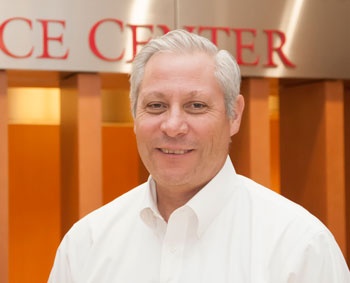One afternoon earlier this spring, six teams of third-year PharmD students gathered in Aresty Auditorium, dressed in business attire, laptops loaded up with Powerpoint presentations.
With white coats no where to be found, each team had come prepared to present the best business plan for bringing “Alzban,” a fictional cure for Alzheimer’s disease, to market.
Each cross-functional team presented a detailed business plan, with each member taking on a unique leadership role, either as CEO, Chief Marketing Officer or Chief Medical Officer.
The competition, judged by a panel of pharmaceutical industry leaders, is the brainchild of adjunct assistant professor Ed Lieskovan, who for more than a decade has included the event as the final milestone in the popular semester-long elective he teaches, “Pharmaceutical Development and Commercialization.”
Dr. Lieskovan – formerly with Eli Lilly & Co, where he was involved with the launch of Prozac and other drugs – takes time out of his business ventures to teach the course each spring, bringing in as guest lecturers top pharmaceutical industry executives who also happen to be Trojan alumni, including Richard Spivey, former Senior Vice President of Allergan.
The goal? Help pharmacy students build self-confidence, learn to work in teams and develop the interpersonal and problem-solving skills they’ll need as the profession expands and becomes increasingly interdisciplinary.
“The whole game is changing”
The course stands out from others, says third-year PharmD student Krysty Avila, because of the real-life access it provides to networking opportunities that lead to summer internships, rotations and other industry opportunities. “It truly is a unique opportunity and I’m glad to have been able to gain this exposure as a student at USC.”
With increasing numbers of pharmacists entering the profession every year, taking on greater responsibility in patient care and stepping outside traditional practice settings, business skills and networking are key, Lieskovan says.
“The whole game is changing,” Lieskovan says. “We need to pay attention to the marketplace. We need pharmacists thinking and solving problems, not just dispensing.”
Lieskovan, whose uncle graduated from USC School of Pharmacy in 1913, traces the beginnings of his passion for mentoring to his own experience as a pharmacy student at USC in the 1980s, when Fred Weissman, Associate Dean for Academic and Clinical Affairs, helped him get his first job. That moment, Lieskovan says, was his introduction to USC as a “world-class system of mentors.”
“This is how the world works,” Lieskovan says. “If our students can be mentored by these kinds of people, with the brains they have, their careers will skyrocket.”


